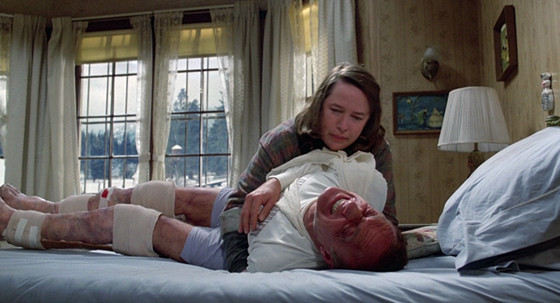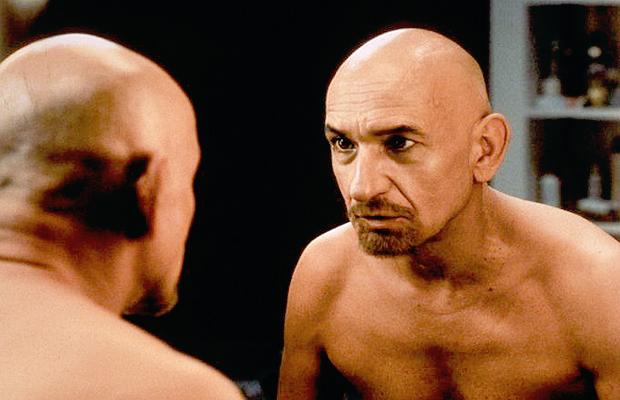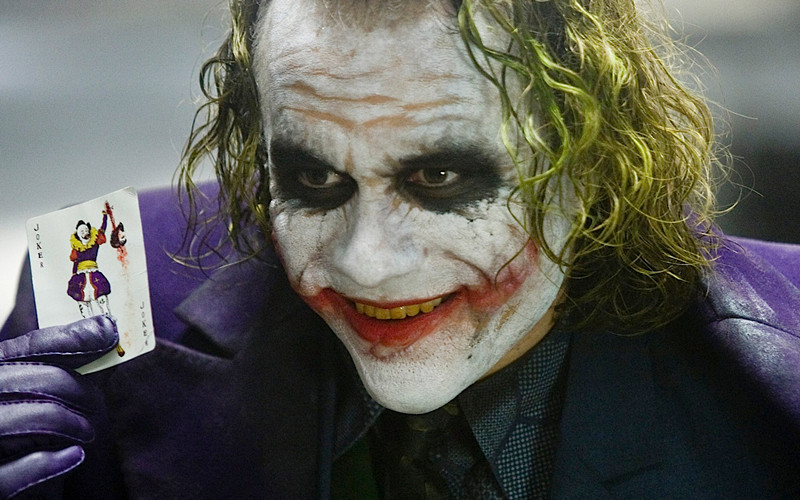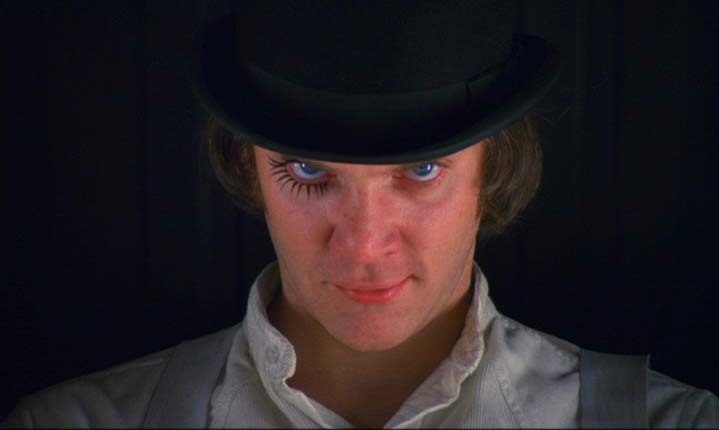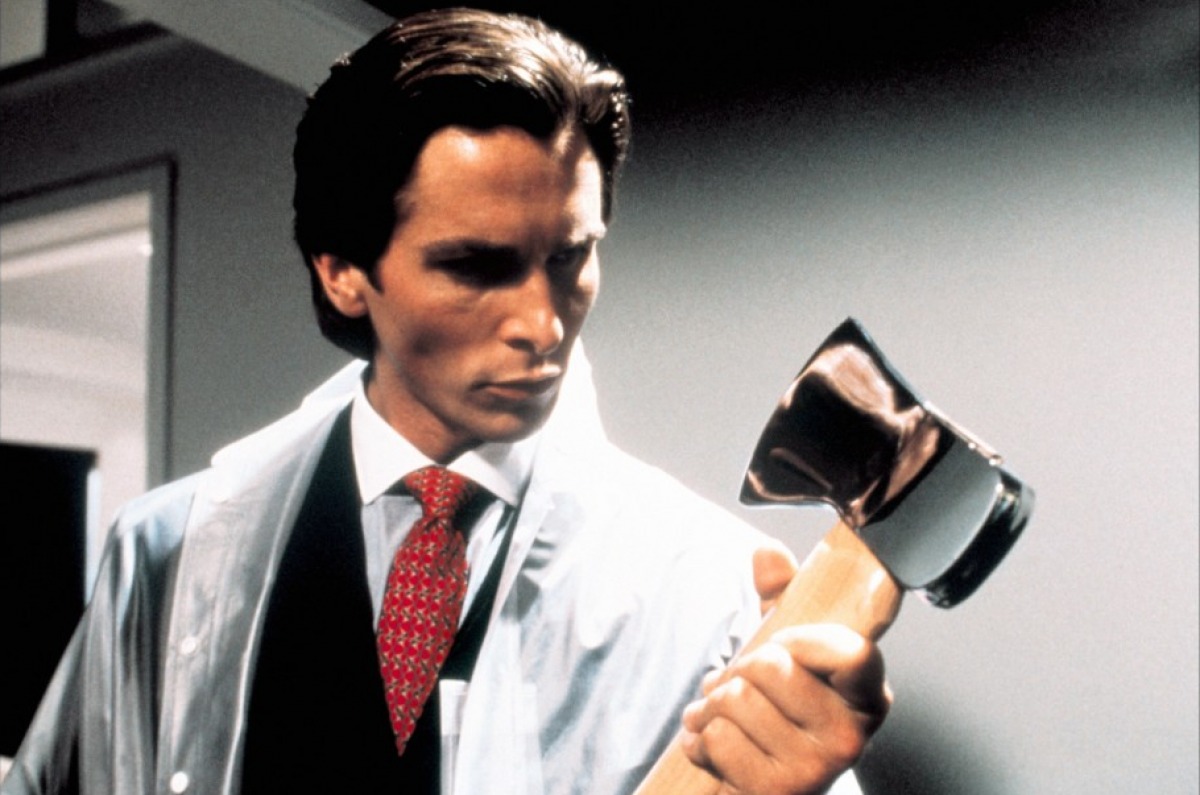7. Misery (1990)
The Psychopath: Annie Wilkes (Kathy Bates)**
Here we have an example of someone who is not just a psychopath, but likely suffers from one or more other mental illnesses as well.
Those who’ve read the Stephen King book Rob Reiner’s first-rate adaptation is based on might be tempted to diagnosis the self-proclaimed “number one fan” of fictional writer Paul Sheldon (played by James Caan) as manic-depressive, and possibly even schizophrenic, in addition to clearly exhibiting a lack of empathy or guilt. It’s this co-morbidity that makes Annie Wilkes exceptionally scary.
Having rescued her favorite writer from an all but certain death in a snowbound car crash, the former nurse tends to her patient… until she learns that he killed off “Misery,” the protagonist of his bestselling series, in his latest novel. What follows is a nail-biting suspense saga, as Annie forces Paul to write a new book resurrecting the character.
The film leaves out some of the grosser moments from the book, but filmgoers will still find plenty to cringe at. Like all great horror stories, the story scares by exploiting our worst fears, specifically: finding yourself helpless, immobilized, and at the mercy of a clearly irrational and dangerous person.
Bates dives headfirst into the juicy role, delivering a performance that would be funny at times if the situation weren’t so harrowing. It’s a tough balancing act, and she absolutely nails it.
Memorable Psychopathic Quote: “I thought you were good, Paul… but you’re not good. You’re just another lying ol’ dirty birdy.”
6. Sexy Beast (2001)
The Psychopath: Don Logan (Ben Kingsley)*
That the same actor who once played the saint-like Mahatma Gandhi succeeds wildly in this role as well proves without a doubt the versatility of the knighted British actor Ben Kingsley. As the erratic, motor-mouthed, gleefully profane gangster Don Logan, Kingsley basically gives us the anti-Gandhi.
His interpretation of Logan, which he claims to have been partially based on his own grandmother (make of that what you will), evokes the temperament of a rabid dog. With a thick Cockney accent, a barrage of colorful profanity, and a stubborn streak to boot, his drive to bring retired gangster Gal (Ray Winstone) back to London for one last job borders on the insane.
By attacking the role with the fierce dedication only the best actors are known to bring, Kingsley almost single-handedly turns this adequate but otherwise forgettable crime thriller into something truly special. For that reason, it’s a must-see.
Memorable Psychopathic Quote (and yes, this is verbatim): “No! No no no no no no no no no! No! No no no no no no no no no no no no no! No! Not this fucking time! No fucking way, no fucking way! No fucking way, no fucking way, you made me look a right cunt!”
5. Schindler’s List (1993)
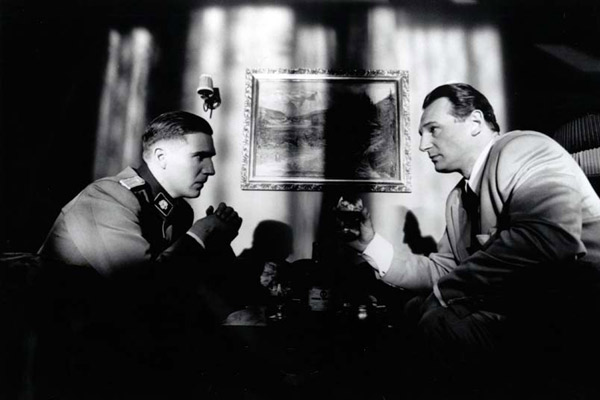
The Psychopath: Amon Goeth (Ralph Fiennes)*
When psychopathy is combined with unchecked power and a learned hatred for a particular group, this is the ugly result. Sadly based on a real person, whose cruel deeds are faithfully recreated here without exaggeration, the principal antagonist of Steven Spielberg’s Holocaust-themed masterpiece is, for many, the definitive cinematic Nazi.
As commandant of the Płaszów concentration camp in Nazi-occupied Poland, Goeth carries out point blank executions, abuses his terrified Jewish maid, and uses camp inmates for target practice.
Fiennes, who put on nearly thirty pounds for the role, plays Goeth with malicious charm (he was, after all, cast by Spielberg partly because of his ability to give off an “evil sexuality”). His bloodlust is matched only by his vanity, which Schindler (Liam Neeson) at one point tries to appeal to in an effort to get him to spare the lives of prisoners.
The character, while unquestionably evil, is notably complex, particularly in terms of the conflicting feelings he displays towards Helen Hirsch, the Jewish prisoner he selects to be his personal maid. He is still, of course, a firm believer in the party.
With a final adjustment to his hair and an unrepentant “Heil Hitler,” Goeth is remorseless to the end, perfectly embodying not only the madness of Nazi ideology, but also its power to seduce. This is hardly Fiennes’s only villainous performance, but it’s easily his scariest and arguably his best.
Memorable Psychopathic Quote: “I would like so much to… reach out and… touch you in your loneliness. What would that, what would that be like, I wonder? I mean, what would be wrong with that? I realize that you’re not, a-a person in the, the strictest sense of the word, but… um, maybe you’re right about that too.”
4. The Dark Knight (2008)
The Psychopath: The Joker (Heath Ledger)**
A “psychopathic, mass-murdering, schizophrenic clown with zero empathy.” This is how Heath Ledger described his vision for The Joker.
Much has already been written about what became Ledger’s final complete performance, for which he won a deserved posthumous Oscar, among many other awards. His interpretation of the legendary supervillain (Batman’s first nemesis in the comics, by the way) was universally acclaimed, though not every fan realizes just how much of himself Ledger put into the role.
His preparation included locking himself away in a motel room for weeks, perfecting the Joker’s voice, laugh, and even keeping an in-character diary. He ultimately ended up designing the character’s makeup, as well as directing the homemade videos the Joker sends in the film.
While in retrospect it may be hard to imagine anyone else in the role, many were dismayed by the initial announcement of Ledger’s casting (similar to what occurred when Michael Keaton was cast as the title character in Tim Burton’s Batman back in 1989).
It may have seemed like an odd choice at the time, but then again, many of Ledger’s bold career moves went against expectations, given his reputation as a teen heartthrob. It’s to director Christopher Nolan’s credit that he saw fit to cast Ledger, giving us not only one of the greatest comic book movie villains of all time, but one of the best movie villains PERIOD.
Our prior familiarity with the character – especially with Jack Nicholson’s take on the Joker in the Burton film – jolted those unprepared for Ledger’s portrayal of the villain, which sapped him of any element of camp and made him actually frightening.
The small, idiosyncratic touches he adds, from the white paint residue on his hands to the intermittent tongue flicks, ground the character in reality and cement him in our memories even further. The purposely conflicting backstories he gives for how he got his facial scars only add to the dark mystery of the self-proclaimed “agent of chaos.”
Memorable Psychopathic Quote: “See, their morals, their code… it’s a bad joke. Dropped at the first sign of trouble. They’re only as good as the world allows them to be. I’ll show you, when the chips are down, these, uh… these civilized people? They’ll eat each other. See, I’m not a monster. I’m just ahead of the curve.”
3. A Clockwork Orange (1971)
The Psychopath: Alex DeLarge (Malcolm McDowell)
Given that the film’s protagonist is advertised as having a penchant for “rape, ultra-violence, and Beethoven,” this one’s inclusion is obvious. What makes Alex, the “humble narrator” of Stanley Kubrick’s controversial adaptation of Anthony Burgess’s novel, so compelling is the juxtaposition of his savage actions with his intelligence and otherwise cultured tastes.
Malcolm McDowell, who was only 27 when the film was made, infuses Alex with wit and charm, even when committing the depraved deeds he so enjoys (you’ll never listen to “Singin’ in the Rain” the same way again, that’s for sure). The fictional futuristic slang he uses only helps to endear him to us (as much as that’s possible).
Alex’s clearly psychopathic nature is itself the central focus of the film, which we see when he undergoes a form of aversion therapy dubbed “the Ludovico technique” after he’s imprisoned for murder.
The experiment works, conditioning him against all forms of sex, violence, and by accident, Beethoven’s Ninth Symphony. He becomes the “clockwork orange” of the title, and while the treatment makes him harmless and thereby a defused threat to society, it also leaves him defenseless and incapable of exercising his free will, thus forming the film’s most interesting ethical dilemma.
McDowell’s success at lending the character ANY sympathy, while no doubt aided by the musical and directorial choices, is an impressive accomplishment for someone playing such an otherwise repellent character. One of Kubrick’s most celebrated and concurrently infamous films, it still shocks today in its unrepressed depiction of sex and violence mixed with at times beautiful music and stylistic editing.
And of course there’s McDowell, one eye adorned with false eyelashes, as the unrestrained id at the core of the film, his visage staring up at us from the film’s famous poster. As far as antiheroes go, this is one of the scariest and most well-executed examples.
Memorable Psychopathic Quote: “What we were after now was the old surprise visit. That was a real kick, and good for laughs and lashings of the old ultra-violent.”
2. The Silence of the Lambs (1991)
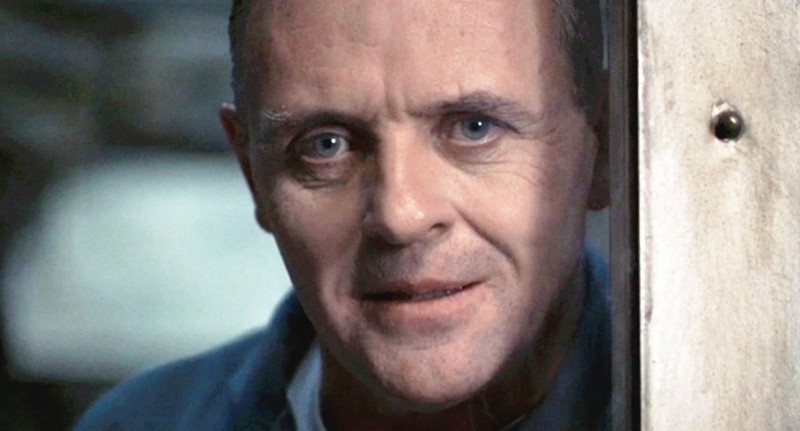
The Psychopath: Dr. Hannibal Lecter (Anthony Hopkins)**
What more can be said about “Hannibal the Cannibal” that hasn’t been said already? The character, who first appeared in the Thomas Harris novel Red Dragon, has been played by four actors at this point (five if you count the child actor in Hannibal Rising), and while Danish actor Mads Mikkelsen has seamlessly slipped into the good doctor’s skin on NBC’s “Hannibal,” it’s Sir Anthony Hopkins who has not only played him the most times, but permanently etched him into the international consciousness. His embodiment of the character is ineffaceable, the endless spoofs and pop culture references over the years confirming it (we like to laugh, after all, as a defensive mechanism at the things that disturb us).
Despite appearing on screen for less than a quarter of the film’s running time, Hopkins managed to snag an Oscar for Best Actor in a Leading Role, such was the power of his limited time on screen. The dramatic buildup to his first appearance in the film’s opening scenes only heightens the tension when we first see the refined and confined killer – an excellent use of anticipation and suspense.
But is Hannibal Lecter a true psychopath? While the question may seem strange, as Lecter is likely one of the first characters many think of when they hear the word, his psychological profile is far from characteristic of the personality disorder.
In addition to his atypical genius IQ and elegant air of sophistication, the former psychiatrist does at times display a capacity for empathy, especially in his fascinating relationship with FBI trainee Clarice Starling (Jodie Foster), as well as an ability to intricately plan ahead, none of which are common in diagnosed psychopaths.
And while the film’s main antagonist is a serial killer nicknamed “Buffalo Bill” (Ted Levine) for his habit of skinning his victims, it is Hopkins who really grabs our attention (and considering what Bill does with those skins, that’s saying something). He may not be your standard psychopath, but Hannibal Lecter is, and always will be, pure nightmare-fuel.
Memorable Psychopathic Quote: “Amputate a man’s leg and he can still feel it tickling. Tell me, Mom, when your little girl is on the slab, where will it tickle you?”
1. American Psycho (2000)
The Psychopath: Patrick Bateman (Christian Bale)
As played by Christian Bale in Mary Harron’s adaptation of Bret Easton Ellis’s divisive 1991 novel, Patrick Bateman is the quintessential movie psycho(path).
The film’s violence, while gruesome, is toned down significantly from that which appears in the book (filming some of the novel’s scenes literally would have rendered the film nearly unwatchable, given their stomach-churning excess). Instead, the focus is redirected at the biting satire inherent in the story.
Patrick Bateman shamelessly embraces the materialism that was idealized in his time and place (the yuppie culture of late 1980’s New York City), so much so that it’s hard to take the film too seriously.
As someone obsessed with his own physical appearance, pop music, and simply fitting in, all of which he details in the film via voiceover and to an even greater, borderline absurd degree in the book (which, interestingly, is almost violence-free for it’s first quarter or so), Bateman’s actions come across as a desperate attempt to fulfill his inner needs. He does this by resorting to drug use, sex with hookers, and ultimately, serial murder.
It’s the last one of these practices, naturally, that makes the film so notorious, one of the highlights of which includes an axe murder set to the tune of a song by Huey Lewis and the News (echoes of the torture scene in Reservoir Dogs, perhaps?).
Tellingly, however, it wasn’t any of the killing scenes, but an (admittedly outrageous) extended sex scene involving Bateman and two prostitutes that got the film in hot water with the MPAA, requiring trims in order to ensure an R-rating. As the protagonist, Bale gives what is still one of his greatest performances, making the Wall Street investment banker both humorous and scary.
Preparing for the film with one of his now trademark physical transformations, Bale portrays an Adonis of male beauty, which, of course, is how Bateman wants to both see himself and be seen by others. His highly articulate bits of narration are almost poetic in describing the hollow and meaningless nature of his outwardly successful life and privileged existence.
Rich, handsome, well-connected, and with an equally shallow circle of friends and a beautiful fiancée (Reese Witherspoon), Bateman remains, in his own words, someone who has “all the characteristics of a human being: flesh, blood, skin, hair; but not a single, clear, identifiable emotion, except for greed and disgust.”
The veracity of his killing spree is kept intriguing vague – many might read the fact that he so frequently and easily gets away with murder (literally) as requiring too great of a suspension of disbelief to be real, while others hold that it is merely part of the film’s hyper-stylized social commentary and black comedy.
One thing, however, is certain: while the book and film may primarily have aimed to skewer a culture of greed and over-consumption, both have also succeeded in creating one of the most chillingly accurate depictions of a psychopath in fiction. The title could not be more fitting.
Memorable Psychopathic Quote: “There is an idea of a Patrick Bateman; some kind of abstraction. But there is no real me: only an entity, something illusory. And though I can hide my cold gaze, and you can shake my hand and feel flesh gripping yours and maybe you can even sense our lifestyles are probably comparable… I simply am not there.”
AUTHOR’S NOTE: Clearly, Hollywood has a thing for psychopathic characters. They are, after all, highly dramatic and endlessly interesting, by their very nature. Given the sheer volume of movies featuring such characters, it was surprisingly tough to narrow down this list – which is by no means meant to be comprehensive – to just thirty.
So for all you eager commenters out there, and in the interests of anticipating any oversights, here is a list of ANOTHER thirty that didn’t make the first cut, organized alphabetically:
Badlands (1973)
Bronson (2009)
Cruel Intentions (1999)
The Devil’s Double (2011)
Gone Girl (2014)
I Saw the Devil (2011)
The Killer Inside Me (2010)
Killer Joe (2012)
The Last House on the Left (1972)
Lolita (1962)
The Loved Ones (2012)
The Lovely Bones (2009)
Marathon Man (1976)
Nightcrawler (2014)
Orphan (2009)
Pan’s Labyrinth (2006)
Pretty Persuasion (2005)
Primal Fear (1996)
Saw (2004)
Scarface (1983)
Scream (1996)
The Shape of Things (2003)
The Snowtown Murders (2012)
To Die For (1995)
Training Day (2001)
The Usual Suspects (1995)
Wall Street (1988)
Wolf Creek (2005)
The Wolf of Wall Street (2013)
Zero Day (2003)
Author Bio: Jason Turer received his B.A. from Cornell University with a double major in Film and English, and currently works in TV and film production in New York City. He has too many favorite films to list here, but some of his favorite directors include Kubrick, Cronenberg, Hitchcock, and Lynch.
